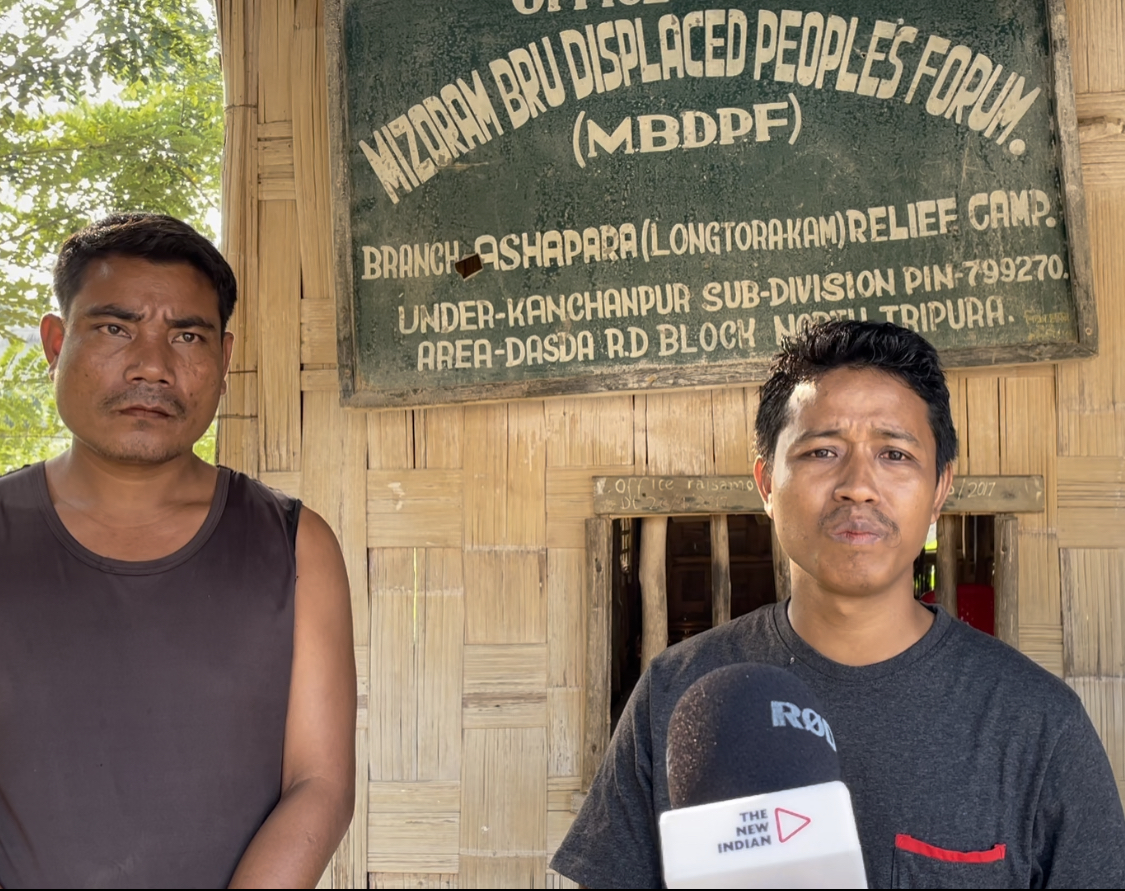KANCHANPUR/AMBASSA(TRIPURA): At 35, Govinda Bru, a father of three kids, and a member of vulnerable tribal group from Mizoram, had almost lost hope of living a dignified life in Tripura’s Ashapara, a poor suburb in a hilly terrain.
He belongs to a community of 37,000 such Bru tribals, also known as Reangs, who left Mizoram after they faced violence from ethnic groups in 1997 and took shelter in this hill state.
He went from home to home to teach subjects he’s learnt from his friends and earn a livelihood.
For 25 years, displaced people like Govinda have been surviving on a daily government dole of Rs 2.5 to Rs 5, depending on their age.
“I came from Mizoram in 1997 and have been living my life like this. We searched for proper jobs all these years but we still have no access to schools, health centres or a place to stay. But now, hopes have risen,” says Govinda.

The Centre, Biplab Dev government in Tripura and Manipur government in January 2020 signed a quadrilateral agreement with these Brus to resettle them.
The New Indian team went on ground to Kanchanpur, Ambassa, Dhalai, Anandbazar and several areas of Tripura to check their reality.
While several local Bengali people and Mizos have been against their resettlement, the Tripura government and MHA have refused to back out of the agreement.
Some of the women sell betel nuts or collect trash from local homes to earn a livelihood, a struggle which they now want to end.
“We wait a long while to get the relief of Rs 5/day, which comes as a cumulative amount after every three months. This amount is our lifeline. Otherwise, we sell snacks, collect trash, find seasonal labour jobs, or else idle. We are grateful that in this government’s term, we are getting our money through Direct Beneficiary Transfer. Previously, the money never reached us,” says Nirmal Bru, whose only hope is to see his grandchildren get education and have a permanent place to stay.
Their houses, made out of bamboo, are crumbling. Most of these houses don’t have washrooms and the women are forced to bathe in public spaces.
After last year’s quadrilateral agreement, the Tripura government has allotted the tribal community 11 districts for resettlement with a funding of Rs 600 crore, apart from Rs 1.5 lakh as housing assistance, Rs 4 lakh as one-time cash benefit for sustenance and monthly allowance of Rs 5,000 — a 1000-fold jump from Rs 5 they were getting earlier.
They call this a victory but break down into tears, dredging-up memories of violence they faced in Mizoram for 60 years by the locals, that forced them to come to Tripura

“We are a minority community from Mizoram. We were 37,000 people who fled post unrest. 5,000 went back and the rest continue to live here. All we had done wrong was to demand safeguarding of our language and culture and sought autonomous council. But our home and properties were burnt. We were forced to live like refugees in our own country,” says Bruno Msha, General Secretary, Mizoram Bru Displaced People Forum.

They have indeed overcome obstacles and their fight is now bringing collective joy in this mountainous region after MHA’s approval for their resettlement.
The uncertainty, however, persists as two organizations — Mizo Convention, an outfit of Mizo tribes and Nagrik Surakasha Mancha — have formed a Joint Movement Committee (JMC) to announce that not more than 1,500 Bru families would be allowed to settle in Kanchanpur.
“Considering this is a humanitarian crisis, we are thankful to the Tripura government and the BJP government at the Centre that an agreement was signed last year. 6,559 families are now benefiting from that. 1,000 families have already got new homes,” smiles Msha.
Winters are particularly harsh. Lack of proper cold-gear and cover leads to severe hardships. They struggle to light up fire in the evenings to generate warmth. Among them, the kids are the most vulnerable and exposed to seasonal ailments and other diseases — a reason why Centre is routinely sending National Commission for Protection for Child Rights for the children’s welfare to the state.

“Half of the population is children. Our role becomes prominent, especially now, as we are required to provide for schools and monitor their four basic rights — survival, development, participation and protection. When I first visited them (the refugees) in 2017-18, the kids told me they didn’t even know the national anthem. We are working closely with the Tripura government to end their struggles,” says Priyank Kangoongo, chairman, NCPCR, who was visiting Kanchanpur sub division of North Tripura for providing aid to kids, when the New Indian team was present.

“Earlier we would get just 600 grams of rice and Rs 5. Now with our resettlement, we can say the bad times are over,” says Laldingliana, President, Mizoram Bru Displaced People Forum. With hope clearly reflecting in their eyes, the Brus are happy that things are changing and the future is looking bright.
Also Watch: Cleanest Since World War 2, This Tripura Village Of Mizos With No Livestock Wants PM To See It


















